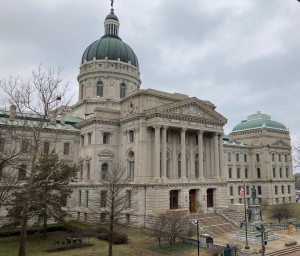UPDATE: Senate Bill 146 was amended Feb. 5 on the Senate floor to remove provisions that conflict with federal child labor law.
Indiana legislators seem determined to roll back regulations that protect children from exploitative work conditions, even if it means clashing with the federal Fair Labor Standards Act.
One anti-regulatory bill, House Bill 1093, has been approved by the House and sent to the Senate. Another, Senate Bill 146, is up for second-reading amendments in the Senate today. Both measures would significantly ease restrictions on the hours that minors can work in Indiana.
They mark a turning away from a 100-year commitment by state and federal governments to protecting children and enabling them to get an education without being burdened by working for wages.
SB 146, for example, would let 14- and 15-year-olds work as late as 9 p.m. on school nights and 11 p.m. on non-school nights. It would let those students work six hours on a school day and 28 hours during a school week. All those provisions would conflict with federal law.
It’s easy to imagine employers pressuring young workers to put in long hours, taking away scarce free time. As the Indiana School Boards Association points out, under SB 146, 14-year-olds could put in 14-hour days, counting school and a job, up to four days a week. And that doesn’t include homework.
Importantly, this is an education issue, not just a child welfare issue. “When minors aged 14 or 15 are working late, long hours on school nights, it will lead to students neglecting homework, missing sleep, and contribute to ever increasing absenteeism,” the ISBA says in talking points on the bill.
Support for the legislation comes from employers who have struggled to fill low-wage jobs in the strong economy and who see expanded child labor as a solution. It seems to align with Indiana lawmakers’ push to “reinvent high school” by shifting support from academics to on-the-job training.
It’s also part of a national attack on child labor restrictions spearheaded by the Foundation for Government Accountability, a Florida-based advocacy group. A Washington Post analysis found that federal child labor violations tripled in the past decade. It reported that 19 states had introduced legislation to weaken child labor protections, often promoted by the National Restaurant Association.
“The trend reflects a coordinated multi-industry push to expand employer access to low-wage labor and weaken state child labor laws in ways that contradict federal protections, in pursuit of longer-term industry-backed goals to rewrite federal child labor laws and other worker protections for the whole country,” the liberal-leaning Economic Policy Institute says in a backgrounder.
As for the Indiana legislation, employers who are pushing it may not like the results.
Terry Spradlin, the Indiana School Boards Association executive director, said in a letter to state senators that he had spoken with a U.S. Department of Labor official about SB 146. If it passes, the official said, her division will enforce the more restrictive federal law and “will be forced to increase citations of child labor law violations and, thus, increase the fines and penalties on Indiana employers.”
At the very least, students and employers will be confused by conflicting laws, the ISBA says.
It seems odd to even be having this debate. Many of us thought child labor issues were settled over 100 years ago, when Progressive Era legislation – including a proposed federal law championed by Sen. Albert Beveridge of Indiana – put an end to children working in mines, factories and workhouses.
But here we are again, arguing that children deserve a childhood and that their education should take priority over work. Let’s hope Indiana lawmakers listen to reason.

